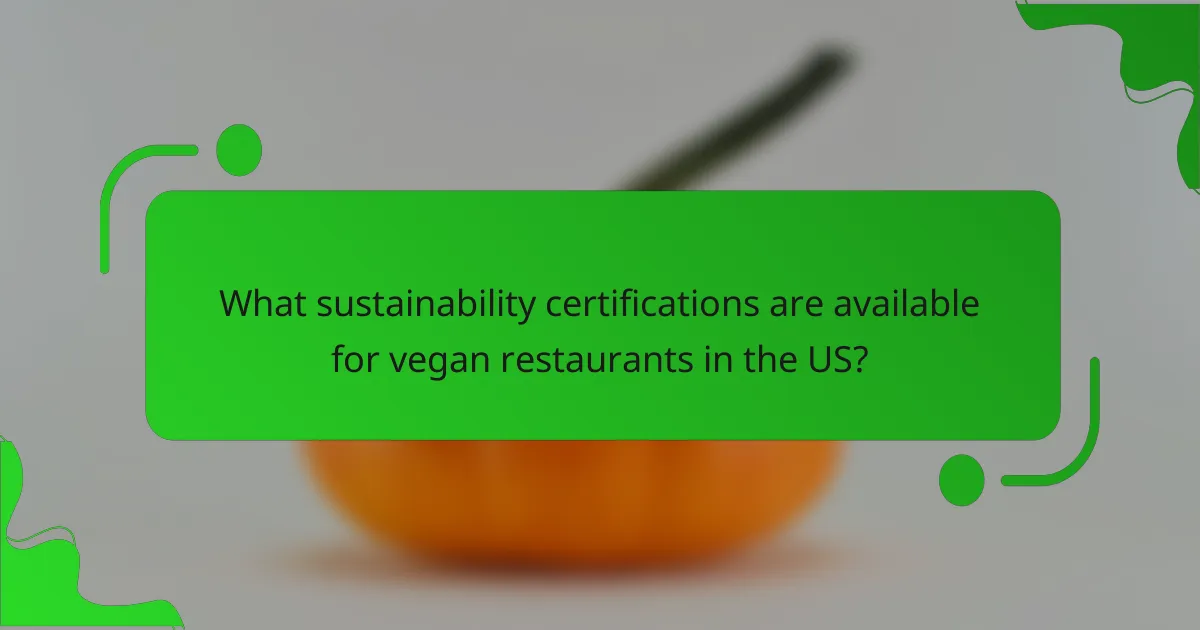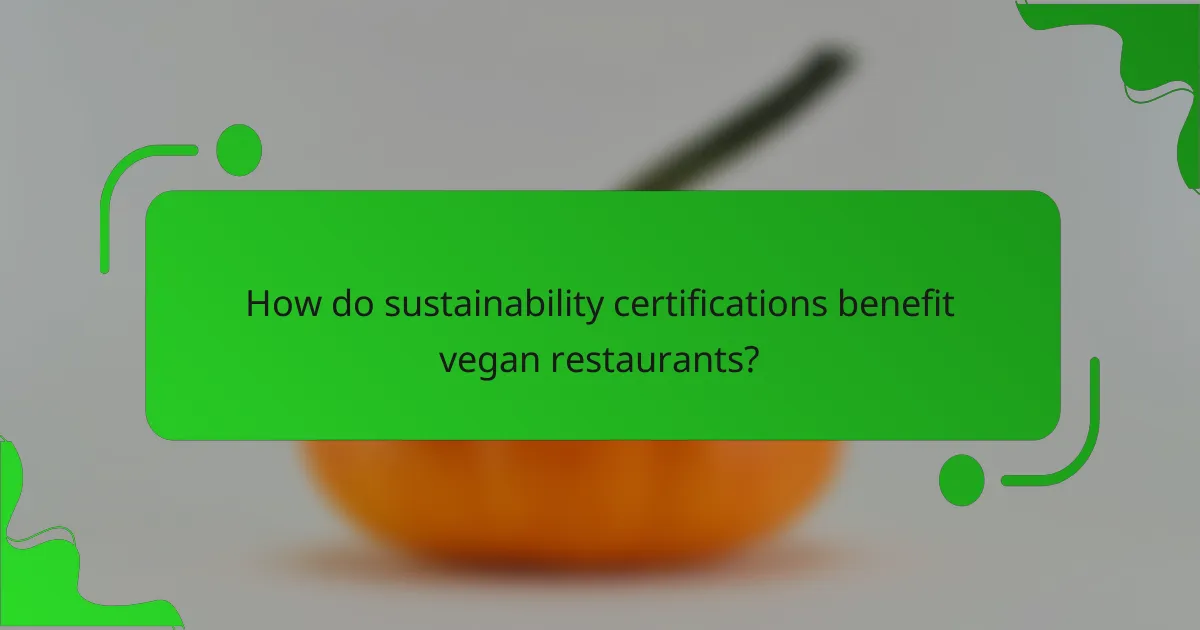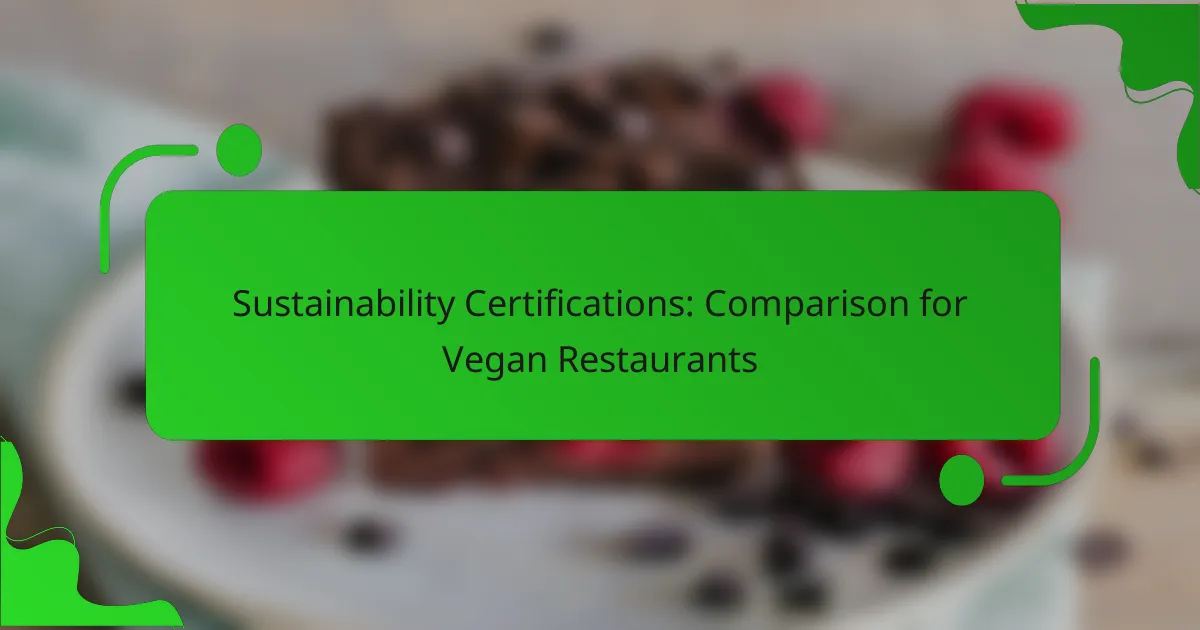Vegan restaurants in the US can enhance their credibility and attract a loyal customer base by pursuing various sustainability certifications that reflect their commitment to ethical and environmentally friendly practices. These certifications not only help consumers identify businesses that align with their values but also provide a structured approach for restaurants to showcase their dedication to health, environmental impact, and social responsibility.

What sustainability certifications are available for vegan restaurants in the US?
Vegan restaurants in the US can pursue several sustainability certifications that highlight their commitment to ethical and environmentally friendly practices. These certifications help consumers identify businesses that align with their values regarding health, environmental impact, and social responsibility.
Certified Vegan
The Certified Vegan logo indicates that a product contains no animal ingredients and has not been tested on animals. This certification is particularly important for vegan restaurants, as it assures customers that all menu items adhere to vegan principles.
To obtain this certification, restaurants must submit an application along with documentation proving that their food and ingredients are free from animal products. Regular audits may be required to maintain compliance.
Green Restaurant Association Certification
The Green Restaurant Association (GRA) certification focuses on a restaurant’s overall sustainability practices, including energy use, waste management, and sourcing of ingredients. This certification is beneficial for vegan restaurants aiming to enhance their environmental footprint.
Restaurants can earn points in various categories, such as water conservation and sustainable food sourcing, to achieve different levels of certification. The GRA provides a clear framework to guide restaurants in improving their sustainability efforts.
USDA Organic Certification
USDA Organic Certification ensures that food products are grown and processed without synthetic fertilizers, pesticides, or genetically modified organisms (GMOs). For vegan restaurants, this certification is crucial for sourcing high-quality organic ingredients.
To achieve this certification, restaurants must work with certified organic suppliers and maintain detailed records of their sourcing practices. This certification can enhance a restaurant’s appeal to health-conscious consumers.
Non-GMO Project Verified
The Non-GMO Project Verified seal indicates that a product has been tested and meets strict standards for non-GMO status. This certification is relevant for vegan restaurants that prioritize transparency and ingredient integrity.
Obtaining this certification involves a rigorous verification process, including testing of ingredients and ongoing compliance checks. It can help vegan restaurants attract customers who are concerned about GMOs in their food.
Fair Trade Certified
Fair Trade Certification ensures that products are sourced from producers who receive fair wages and work under safe conditions. For vegan restaurants, this certification is particularly relevant when sourcing coffee, tea, and other ingredients.
Restaurants can enhance their ethical sourcing by partnering with Fair Trade certified suppliers. This not only supports sustainable practices but also appeals to consumers who value social responsibility in their dining choices.

How do sustainability certifications benefit vegan restaurants?
Sustainability certifications provide vegan restaurants with a structured way to demonstrate their commitment to environmentally friendly practices. These certifications can enhance credibility, attract a loyal customer base, and open doors to new market opportunities.
Enhanced brand reputation
Obtaining sustainability certifications can significantly boost a vegan restaurant’s brand reputation. Certifications from recognized organizations signal to customers that the restaurant adheres to high environmental standards, which can differentiate it from competitors.
For example, a restaurant certified by the Green Restaurant Association may attract eco-conscious diners who prioritize sustainability in their dining choices. This enhanced reputation can lead to positive word-of-mouth and increased media attention.
Increased customer trust
Sustainability certifications foster increased customer trust in vegan restaurants. When customers see a certification, they are more likely to believe that the restaurant is genuinely committed to sustainable practices rather than just marketing claims.
To build this trust, restaurants should display their certifications prominently on menus and websites. Transparency about sourcing and sustainability efforts can further reinforce this trust, encouraging repeat visits from satisfied customers.
Access to eco-conscious markets
With sustainability certifications, vegan restaurants can tap into eco-conscious markets that prioritize sustainability in their purchasing decisions. Many consumers are willing to pay a premium for meals from certified establishments, which can lead to higher profit margins.
Additionally, certifications can facilitate partnerships with suppliers and distributors who share similar values. This access can help restaurants source ingredients that align with their sustainability goals, enhancing their overall offerings.

What are the costs associated with obtaining sustainability certifications?
Obtaining sustainability certifications for vegan restaurants involves various costs, including application fees, annual renewal costs, and potential consultation expenses. These costs can vary significantly based on the certification body and the specific requirements of each program.
Application fees
Application fees for sustainability certifications typically range from a few hundred to several thousand dollars, depending on the certification type and the size of the restaurant. For example, a small vegan café might pay around $300 to $1,000, while larger establishments could face fees upwards of $2,000.
It’s essential to research multiple certification options to find one that aligns with your budget and business goals. Some organizations may offer sliding scale fees based on revenue, which can help manage costs.
Annual renewal costs
Annual renewal costs for sustainability certifications can vary widely, often falling between 10-30% of the initial application fee. This means that if your initial certification cost was $1,000, you might expect to pay $100 to $300 each year to maintain your status.
Be mindful of the renewal timeline, as missing deadlines can result in additional fees or loss of certification. Keeping track of renewal dates and associated costs is crucial for ongoing compliance.
Consultation expenses
Consultation expenses can add another layer of cost when pursuing sustainability certifications. Hiring a consultant to help navigate the certification process may range from $50 to $200 per hour, depending on their expertise and the complexity of your restaurant’s operations.
Consider whether you need a consultant based on your team’s experience with sustainability practices. If your staff is knowledgeable, you may save on costs by handling the application process internally.

How to choose the right sustainability certification for a vegan restaurant?
Choosing the right sustainability certification for a vegan restaurant involves understanding your audience’s values, the specific requirements of each certification, and the associated costs versus benefits. This decision can enhance your restaurant’s credibility and appeal while aligning with your ethical commitments.
Assess target audience preferences
Understanding your target audience’s preferences is crucial when selecting a sustainability certification. Many vegan customers prioritize certifications that emphasize animal welfare, organic practices, and environmental impact. Conduct surveys or engage with customers on social media to gauge which certifications resonate most with them.
For instance, certifications like Certified Vegan or USDA Organic may attract customers who value cruelty-free and organic products. Tailoring your certification choice to align with these preferences can enhance customer loyalty and attract new patrons.
Evaluate certification requirements
Each sustainability certification has its own set of requirements that must be met to achieve and maintain the certification. Research the specific criteria, such as sourcing practices, waste management, and energy efficiency, to determine which certifications are feasible for your restaurant.
For example, the Green Restaurant Association offers a detailed checklist of sustainability practices that restaurants must implement to qualify. Make sure to assess whether your current operations can meet these standards without significant overhauls.
Consider cost vs. benefits
When evaluating sustainability certifications, consider both the financial costs and the potential benefits. Certification fees can vary widely, ranging from a few hundred to several thousand dollars annually, depending on the program. Weigh these costs against the marketing advantages and customer trust that certification can bring.
Additionally, consider the long-term savings associated with sustainable practices, such as reduced energy costs or waste disposal fees. A well-chosen certification can lead to increased sales and customer retention, making it a worthwhile investment for your vegan restaurant.

What are the prerequisites for sustainability certifications?
Sustainability certifications for vegan restaurants typically require adherence to specific criteria that demonstrate commitment to environmentally friendly practices. Key prerequisites include documented sourcing practices, waste management policies, and employee training programs.
Documented sourcing practices
Documented sourcing practices involve maintaining clear records of where ingredients are sourced, ensuring they meet sustainability standards. This may include using local suppliers, organic produce, and verifying that products are free from harmful pesticides and chemicals.
Restaurants should consider creating a sourcing policy that outlines preferred suppliers and the criteria for selection. Regular audits can help ensure compliance and transparency, which are crucial for certification.
Waste management policies
Effective waste management policies are essential for sustainability certifications, focusing on reducing, reusing, and recycling waste generated by the restaurant. This includes implementing composting programs for food scraps and minimizing single-use plastics.
Establishing a waste audit can help identify areas for improvement. Aim to divert a significant portion of waste from landfills, ideally reaching at least 50% diversion through recycling and composting efforts.
Employee training programs
Employee training programs are vital for ensuring that staff understand and implement sustainability practices. Training should cover topics such as proper waste disposal, sourcing standards, and energy conservation techniques.
Consider conducting regular workshops and providing resources that reinforce sustainable practices. Engaging employees in sustainability initiatives can foster a culture of responsibility and enhance the restaurant’s overall commitment to sustainability.

How do sustainability certifications compare in terms of credibility?
Sustainability certifications vary in credibility based on their standards, transparency, and industry recognition. Certifications from reputable organizations often carry more weight, influencing consumer trust and business practices.
Industry recognition
Industry recognition plays a crucial role in determining the credibility of sustainability certifications. Certifications that are widely accepted and endorsed by major environmental organizations tend to be more respected. For example, certifications like Fair Trade and USDA Organic are well-known and trusted by consumers.
When evaluating certifications, consider their visibility in the marketplace. A certification that is recognized by a large number of vegan restaurants or food producers can indicate a higher level of trustworthiness. Look for endorsements from industry leaders or participation in significant sustainability initiatives.
Additionally, check if the certification body is a member of recognized sustainability alliances or networks. This affiliation can enhance the certification’s credibility and demonstrate a commitment to high standards in sustainability practices.



